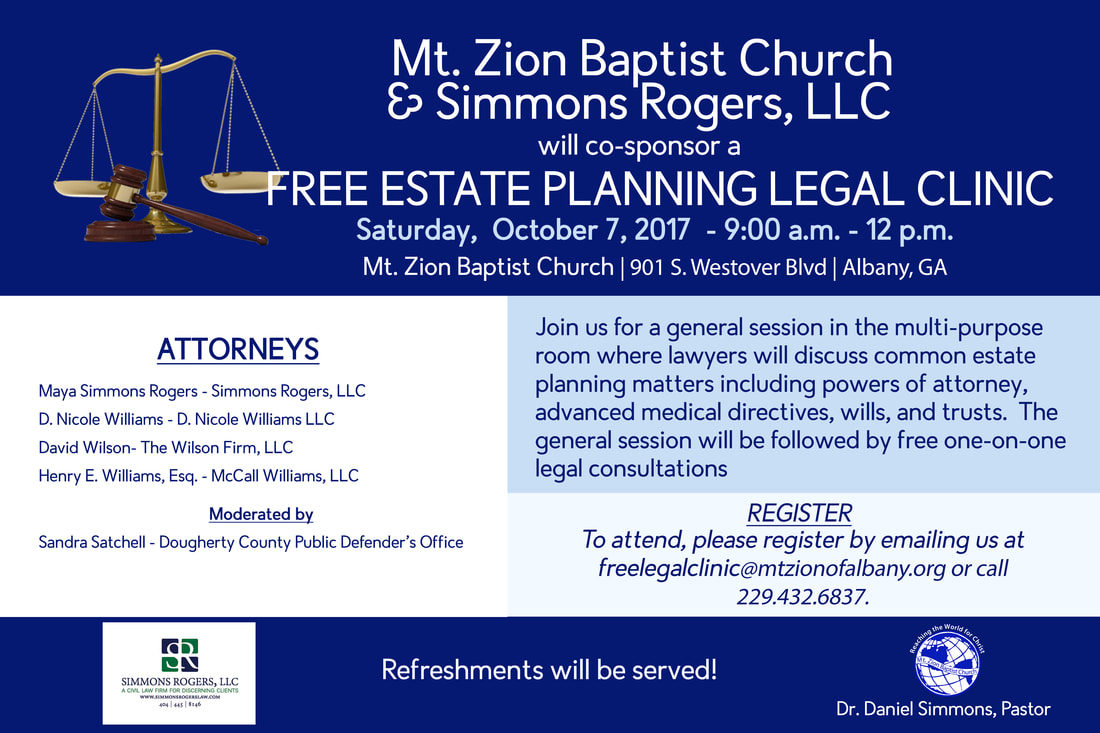Simmons Rogers, LLC will Co-Sponsor a Free Estate Planning Legal Clinic with Mt. Zion of Albany9/15/2017 On Saturday, October 7, 2017, the law firm of Simmons Rogers, LLC will co-sponsor the third free legal clinic at the historic Mount Zion Baptist Church of Albany, Georgia from 9 am - 12 pm. The October clinic will focus on estate planning and cover the most common estate planning topics including wills, trusts, medical directives, and powers of attorney. Sandra Satchell, a member of Mount Zion and an attorney at the Dougherty County Public Defender's Office will moderate the panel of volunteer lawyers. The panelist include D. Nicole Williams, a local attorney and member of Mount Zion, Henry E. Williams, a local attorney and former Terrell County probate judge, David Wilson, an attorney who was raised in Albany, and at Mount Zion, and now practices law in Atlanta, Georgia, and attorney Maya Simmons Rogers, who was also raised in Albany and at Mount Zion. Following the panel session, the panelist and other lawyers will provide free one-on-one estate planning consultations. This event is free and open to the public. Refreshments will be served. To register please email your name and number of guests, if applicable, to [email protected] or call 229-432-6837.  A Power of Attorney (“POA”), is legal document that allows you to name one or more persons to help you handle your financial affairs. It is an essential part of your estate planning. Despite popular belief, estate planning is not limited to figuring out how to distribute your stuff after your death. It also includes planning for the chance that you might be incapacitated at some point in life. If you are incapacitated, it means you lack the mental or physical capacity to sufficiently care for yourself or your property. Incapacitation can be temporary, intermittent, or permanent. You might be temporarily incapacitated physically if you are traveling abroad for an extended period of time. You might be physically and/or mentally incapacitated following a medical procedure. In some cases, a doctor would conduct a psychological exam to determine whether you are mentally incapacitated. In other cases, incapacity may be obvious based on your inability to communicate, if you were in coma, for example. If you become incapacitated, there are acts and decisions related to your finances that must be made on your behalf, such as paying your bills, managing your investments, and possibly employing various service providers. That is where the need for a financial power of attorney prepared by an estate planning lawyer with knowledge of the laws in your state comes into play. Every state has different rules regarding the proper execution of a POA and if the rules are not followed then the POA may not be honored by third-parties or enforceable by law. With a financial POA, you appoint an agent, the person you give the power to handle your financial affairs. You can limit the power and only allow them to do specific things or you can give them power over everything, including but not limited to the power to sell, rent, or mortgage your home, pay your bills, cash or deposit checks, buy and sell your investments, or manage your personal items. However, a financial POA document does not give someone the power to make medical decisions on your behalf. In Georgia, that power is given through an Advanced Medical Directive. There are three main advantages to executing a financial POA: 1. You Have the Power: You decide who your agent will be. You decide which powers to give your agent and you decide when the agent’s power starts and stops. You can make the POA effective immediately, provide a specific start and stop date, or have a start date that is triggered by a future incapacity. Even with a POA in place, you can still handle your own financial affairs as long as you choose to or are able to. More importantly, you may cancel or revoke the POA at any time. 2. It’s Quick and Easy: You don’t have to go through all of your finances and assets. All you need to know is who you want to appoint as your agent and which powers you would want your agent to have. Once your estate planning lawyer understands your wishes, your FPOA can be drawn up and executed or you can wait and execute it with all of your other estate planning documents. 3. You Can Avoid Probate Court. If you become incapacitated and your family cannot agree on who will manage your finances, they could end up in probate court asking a judge to appoint a guardian or conservator for your property. Since court proceeding are public, if they go to court your personal affairs will be public. Plus, the legal dispute could cause an irreparable rift between your family members. In Georgia, you can avoid this by making sure your financial POA is durable. If you have a durable financial POA in place, your family can save a lot of money on the legal expenses associated with probate court and lawyers, keep your affairs private and avoid internal fighting over who has the power to manage your stuff. Your POA will remain in effect until your death, even if you become incapacitated or unable to communicate your wishes, unless: (1) a guardian/conservator is appointed for your property, (2) you include a date or specific occurrence when you want your POA to be canceled, (3) you revoke your agent’s power, or (4) your agent and all successor agents die before you. Upon your death your POA will be canceled and your Last Will and Testament will govern the distribution of your assets. If you have questions about your estate plan, need a power of attorney, or need assistance with estate planning generally, you can contact us. We help clients across the state of Georgia and would love to help you. What do the following music legends: Amy Winehouse, Bob Marley, Jimi Hendrix, Kurt Cobain, and Sonny Bono have in common with Prince? They all died without a will. Whether legend or unknown; rich or poor; young or old; we are all human at the end of the day. As humans, we all have a tendency to put uncomfortable things on the back burner. Talking about death and dying is uncomfortable, so although we know that we need to have a plan in place we put it off. However, avoidance is not the answer. The decision to avoid unpleasant things often ruins families. Bob Marley has been dead for over 30 years and his family is still fighting over his estate. Jimi Hindrix's family also fought over his estate for 30+ years. While you may not have millions, music, or a famous name to fight over, families are often torn apart over the family home, money, cars, jewelry, and other material things. Even if there is no fight, your decision not to have a will can have unintended consequences such as a family member you dislike or a family member you never knew existed inheriting your stuff. Even if what you own does not seem like much to you a will and proper estate planning can help ensure that your family isn't divided over what they think you wanted to happen to your stuff or what they want to do with your stuff. Plus your stuff will go to those whom you desire to have it. Proper estate planning will also address your needs before death if you are incapable of making decisions for yourself. As Wendy Williams said: "wills are not just for rich people, they're for people, people, people!" Check out the clip of Wendy Williams discussing the importance of estate planning below. Please be aware that every state has different laws regarding wills and the probate process so be sure that you consult a licensed attorney in your state for specific advice. If you live in Georgia, the law firm of Simmons Rogers, LLC is here to assist you with all of your estate planning needs.
 We don't always like to acknowledge or discuss our mortality but the fact remains that life the way we know it could change at any moment. That is why estate planning is so important. Estate planning is more than just having a will or setting up a trust. It also helps you plan for situations when you are still alive but can't communicate or make decisions, such as if you are in a state of unconsciousness. The question becomes who will speak for you and make decisions on your behalf? Under the Georgia Advance Directive for Health Care Act, you have the right to make choices about your health care in advance through a legal document known as an advance directive for health care. An advanced directive allows you to speak when you are unable or unwilling to do so by allowing you to list your wishes about medical care and treatment and/or allowing you to choose a person to make medical decisions for you. An advanced directive for health care also allows you nominate a person to serve as your guardian in case a court decides that a guardian should be appointed. A court will appoint a guardian for you if the court finds that you are not able to make significant responsible decisions for yourself regarding your personal support, safety or welfare. You may nominate your health care agent to be your guardian, but you have are free to nominate someone else. You should be aware that the advanced directive for health care does not give your health care agent or guardian the power to manage your property or financial affairs. You may feel like the content of the advanced directive for health care sounds familiar but you thought there was a different title. That's because people used to have living wills to provide instructions on treatment preferences for a terminal condition and state of permanent unconsciousness and a durable power of attorney for health care to appoint a health care agent. However, in 2007, the advanced directive for health care replaced both the durable power of attorney for health care and living wills in Georgia. If you have a durable power of attorney for health care or a living will that was executed before 2007, they remain effective. However, it would be a good idea for you to replace them with an advanced directive. It is important for pregnant women or women who may become pregnant to understand that the directives they select in their advance directive may not be carried out. If the baby is developed enough that the baby could survive post delivery, any directives that would result in withholding or withdrawing life sustaining treatments will not be honored. Even if the baby is not developed enough to survive delivery, a pregnant woman's directives will not be honored unless she has specifically noted that she does not want life sustaining treatment if she is pregnant with a non-viable infant. Once you have completed your advanced directive you should give a copy to your health care provider, especially if you are going in for any procedure or surgery, including giving birth. You should also give a copy to the person you designate as your health care agent and your family. It is also a good idea to keep something in your wallet that would inform medical providers that you have an advanced directive and who to contact in case of emergency. Like all estate planning, your advanced directive will only be honored if it complies with Georgia law. Your advanced directive for health care can be revoked or amended at any time and may be revoked as a matter of law upon marriage or divorce. While the decision to have an advanced directive is completely voluntary, if you have a properly executed advanced directive for health care, you can ease the burden on your love ones during an already difficult period. Your advanced directive for health care can eliminate confusion about your wishes and diffuse any disagreement among family members over health care decisions. Contact the Atlanta based law firm of Simmons Rogers, LLC for help with your advanced directive and all of your other estate planning needs. We work with clients all across the state of Georgia and we would love to work for you.  You might be wondering what is heir property!?! Heir Property is defined as land held in common by descendants of a person who dies without a valid will or whose estate was not offered for probate (meaning it was not taken to probate court for administration). Heir property can also be created when a will leaves property to more than one beneficiary. When a person dies without a valid will, the person dies intestate. All of the property owned by that person is considered intestate property. Intestate property typically passes down automatically to the qualifying heirs as tenants in common. (There are situations when the intestate property does not pass to all of the qualifying heirs but we won't cover them in this blog post.) Likewise, if a will leaves property to multiple beneficiaries, the beneficiaries own the land as tenants in common. As tenants in common, each heir owns a fractional interest in each piece of intestate property which gives each heir equal rights to use and possess the property. While this may not seem like a big deal, when it comes to real property (i.e. land and all of the structures on said land) it is. When there are multiple heirs, owners, the heir property title is considered clouded. As a result, in order to do anything with the land all of the heirs must agree. However, unanimous agreement among heir property owners is rare. In Georgia, especially rural areas, heir property is a common problem. The 5 biggest disadvantages of owning heir property are:
So what can you do to protect your family's heir property?
If there is no heir property in your family, give your ancestors a standing ovation! Then do your part to ensure that heir property never becomes an issue in your family by hiring an attorney to draft a valid will for you as a part of a comprehensive estate plan.  Photo Credit: Best Man Holiday Facebook Page Photo Credit: Best Man Holiday Facebook Page Now that everyone has had time to see the movie, Best Man Holiday, and the risk of spoiling the plot for almost everyone has passed, we wanted to take the time to highlight one of the many life lessons from the movie...planning for your death makes things easier for your friends and family. In the movie, Mia (played by Monica Calhoun), invites the entire gang to her home for Christmas. While everyone initially believes it is just a wonderful chance to get together, they soon realize that the gathering has a deeper purpose. Mia is losing her battle against cancer. She wants to spend time with everyone and help them repair their damaged relationships. While the movie is undoubtably sad, the beauty of the situation is that Mia was able to spend her last days with the ones she loved. Mia's ability to deal with the realities of life, even when her husband Lance (played by Morris Chestnut) could not, allowed Mia to be able to plan for her last days and the days that followed. It appears that Mia had her funeral all planned out, including her request that Harper (played by Taye Diggs) do her eulogy. Often times movies are unrealistic, but this scenario is not. You can be like Mia. Everyone has the opportunity to plan for their demise and ease the burden on their grieving family and friends. The best way to do this is to (1) make sure you have your estate planning documents prepared by a qualified professional and (2) ensure the documents are located in a central place that at least one person is aware of. You are never too young and never to healthy to plan for death. Do not wait until it's too late. Remember, estate planning is not just for you. It helps your loved ones understand your wishes and it lets you speak when you are no longer here. If you would like to discuss your estate planning needs contact Simmons Rogers, LLC. We are here to help. Happy Thanksgiving and safe travels! |
Simmons Rogers, LLCSimmons Rogers, LLC is a full- service civil law firm based in Atlanta, Georgia. We provide legal services as well as mediation and arbitration services, to businesses and individuals throughout the state of Georgia and beyond. Archives
January 2018
Categories
All
This blog is not intended to be a complete explanation of the law. Its purpose is to inform, not to advise on any specific legal problem or legal rights. If you have specific questions regarding any topic in this blog, you are encouraged to consult the Atlanta based law firm of Simmons Rogers, LLC or an attorney licensed in your
state. |

Simmons Rogers, LLC
4045 Orchard Rd SE, Suite 210 Smyrna, Georgia 30080 Phone: 404-445-8146 Fax: 404-445-8226 E-mail: [email protected] |
LEGAL DISCLAIMER
The information on this website is for informational purposes only and is not legal advice. Use of this website does not create an attorney-client relationship between you and Simmons Rogers, LLC. You should not act upon the information within this website without seeking advice from a lawyer licensed in your own state or country. You should not send any confidential information to Simmons Rogers, LLC until and unless a formal lawyer-client relationship has been established in writing. Unless you have received such written confirmation, we will not consider any correspondence you send us as confidential. |
© 2013-2018. All Rights Reserved. Simmons Rogers, LLC
Attorney Advertising. The choice of a lawyer is an important decision and should not be based solely upon advertisements.
Privacy Policy
Attorney Advertising. The choice of a lawyer is an important decision and should not be based solely upon advertisements.
Privacy Policy


 RSS Feed
RSS Feed